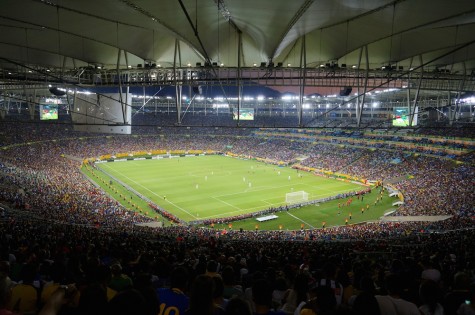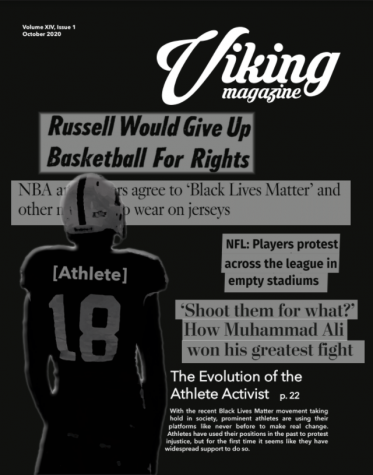FIFA’s dark side
February 11, 2015

Every four years when the World Cup rolls around, a wave of excitement spreads around the world. Countries ranging from the United States to Ghana compete, fans from every country gather together in one stadium, and the culture of the host country is embraced to the fullest. However, behind all the glory, excitement and passion, it is a spectacle to cover up the scandals that are going on behind the scenes within the Fédération Internationale de Football Association (FIFA).
FIFA, which was formed in 1904, is in charge of all of soccer’s major international tournaments, and mainly the bidding, deciding and production of the World Cup. FIFA has established itself as a trusted organization for a long time but in more recent years there have been a series of scandals that have tainted the organization’s reputation.
“[These scandals] made me feel like soccer is not as fair as it seems,” soccer player Alexander Gouyet (‘16) said. “It feels like it is not as pristine as it once was. If there is no answer to corruption, then scandals will require decades to mend and restore soccer’s reputation.”
Looking back on the past decade, many of the scandals have not received a lot of attention in the United States due to other newsworthy stories and events happening closer to home. Therefore, people might not be as informed on the things happening with FIFA unless they are a dedicated football fan. Yet, some of the rule violations and problems are just as outrageous as those receiving a lot of coverage in the United States.
One of the most prominent issues, recently, is around who will host the upcoming World Cups. Although the committee has officially released that Russia and Qatar will be the next countries to host in 2018 and 2022, information has come forth arguing that those on the committee for deciding were bribed into making this decision. Both countries were picked to host instead of the United States, who had also put in a bid. Although the ethics committee for FIFA closed the case in the fall of 2014, the United States is still investigating in hopes to expose some of the corruption within the governing board.
The Federal Bureau of Investigation (FBI) has furthered its corruption investigation against FIFA and is targeting three officials in the organization. The investigation has been slow in development despite clear evidence of money distribution by a member of the bidding board. FIFA’s ethics investigator Michael Garcia, who filed a 400 page report on the bidding process for the 2018 and 2022 World Cups resigned and called for greater “transparency” inside the organization after FIFA’s president Sepp Blatter decided to keep the report confidential.
Another prominent issue within the board of officials is in regards to FIFA’s strict policies towards its sponsors and how it has affected the fans. During a group stage match between Argentina and Netherlands in the 2006 World Cup in Germany, Dutch fans were forced to watch the game in their underwear because their shorts displayed a promotional item from a non-official World Cup sponsor. FIFA went further and also forced Brazil to change its law prohibiting alcohol in soccer stadiums for the most recent 2014 World Cup. The law was originally created to reduce violent altercations between fans and potentially save lives. However, because Budweiser is one of FIFA’s biggest sponsors, they forced Brazil to pass the “Budweiser bill,” as comedian John Oliver calls it. The bill allowed FIFA to sell beer during the World Cup putting the fans safety at risk.
FIFA is not only putting the fans safety at risk, it is also putting the players’ safety at risk. By giving the 2022 World Cup to Qatar, FIFA is forcing players to play in temperatures that can reach 122 degrees Fahrenheit. The athletes will quickly become dehydrated and will not be able to play to the best of their abilities for 90 minutes. The most serious risk that players would be facing would be heat strokes if their body temperatures exceeded 105 degrees fahrenheit. It would be a fatal risk and somehow this was overlooked when the decision to pick Qatar was made.
The players’ safety is threatened every time they play because of FIFA’s policies regarding injuries. Many were shocked to see that German player Christoph Kramer stayed on the pitch during the World Cup Final after sustaining a concussion. Captain and teammate Philipp Lahm gave an account of what he noticed on the field during the game. “I wasn’t worried at first, he played normally but things started [to go badly] when he came to me and said he wanted to take the captain band from my arm,” Lahm said. “When he wanted to trade shirts with the ref I thought ‘it’s enough now’.’”
“I think especially regarding concussions, players should be allowed to be substituted as there is no way they are in a condition to continue playing,” varsity soccer player Siddharth Srinivasan (‘16) said. “Having this not count as a substitution would allow managers to more willingly do the right thing by taking off a player who is mentally shaken.”
Many were witness to the aggressive and even malicious plays during the games in Brazil, namely the acts of Luis Suarez from Uruguay. In a match against Italy, Suarez bit the shoulder of Italian defender Chiellini. It was Suarez’s third offence and he was only banned four months despite an uproar for a longer and more severe punishment. Policies regarding specific injuries are being revised due to complaints by various players and spectators, calling for a minimum three game ban after a redcard and other measures.
“In leagues where the three game ban is not in place, players are almost allowed to be reckless, as the punishment is not severe,” Srinivasan said.
FIFA is set to elect a new president in May 2015. Ex Ballon D’or winner Luis Figo is running against current president, Sepp Blatter, who has been head of FIFA for four terms. Figo is running his campaign focusing on “Better governance, more transparency, increased solidarity and the protection of true football values.” With these resolutions, FIFA will slowly gain their fan’s trust back, bringing back the true passion and wonder of the greatest sport in the world.












